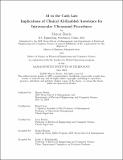AI in the Cath Lab: Implications of Clinical AI-Enabled Assistance for Intravascular Ultrasound Procedures
Author(s)
Borris, Mercer
DownloadThesis PDF (9.711Mb)
Advisor
Levi, Retsef
Daniel, Luca
Terms of use
Metadata
Show full item recordAbstract
Clinical decision support tools enabled by artificial intelligence (AI) are entering the medical field slowly, emerging into a space not yet fully regulated by the FDA and with unclear impacts to both medical professionals and patients. Early AI-based clinical decision support systems in healthcare often focus on assisting tasks related to various modalities of medical imaging. Given the emphasis of the supportive nature of these tools, physicians maintain responsibility for the ultimate decisions. This thesis investigates the impact of an AI-enabled tool on clinical decision-making and task completion time of intravascular ultrasound (IVUS) workflows for coronary procedures. It is based on an experiment that was conducted with the support of Boston Scientific, where engineers have recently developed an exploratory AI model for annotating IVUS images as part of a strategic effort to improve patient outcomes and increase in-house AI knowledge. The experiment results show that completed tasks incorporating the tool’s AI-based calculations are 31% more accurate than the current standard, though this difference is not statistically significant. The AI-enabled tool also significantly reduces the time spent on IVUS workflow decision-making by 18%. A software architecture is also proposed to gather insights on physician-AI interaction and enable continuous monitoring and improvement of productionized AI algorithms.
Date issued
2023-06Department
Massachusetts Institute of Technology. Department of Electrical Engineering and Computer Science; Sloan School of ManagementPublisher
Massachusetts Institute of Technology